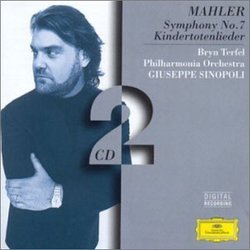| All Artists: Gustav Mahler Title: Mahler: Symphony No. 7 Members Wishing: 0 Total Copies: 0 Label: Dg Imports Original Release Date: 1/1/1998 Re-Release Date: 4/1/1998 Album Type: Import Genres: Pop, Classical Styles: Vocal Pop, Symphonies Number of Discs: 2 SwapaCD Credits: 2 UPCs: 028945313320, 0028945313320 |
Search - Gustav Mahler :: Mahler: Symphony No. 7
 | Gustav Mahler Mahler: Symphony No. 7 Genres: Pop, Classical
|
Larger Image |
CD Details |
CD ReviewsA Beautifully Realized Mahler 7 Plus Kindertotenlieder Grady Harp | Los Angeles, CA United States | 03/06/2006 (5 out of 5 stars) "This recording of Mahler's enigmatic but eminently beautiful Symphony No. 7, often subtitled Song of the Night because of the Nachtmusik movements with Mahler's loving use of cow bells in the scoring, is one of Giuseppi Sinopoli's finest Mahler readings. Conducting the Philharmonia Orchestra he offers as strong a sense of architecture to the difficult first movement that often eludes conductors, so polar is its range from the longing 'Langsam' to the near bombastic 'Allegro risoluto', back and forth in a strange manner. But Sinopoli makes is work. The symphony is as long as the far more familiar No. 9 but seldom is performed in concert halls. If more Mahler lovers could hear how much Sinopoli gives this work, that paucity of performances would probably be reversed. But an additional reason for adding this Mahler disc to the library is the poignant, beautifully sung and communicated 'Kindertotenlieder' by Bryn Terfel. Known for his rich baritone voice and his brilliant sense of communication, Terfel takes these songs of death to another plane and in the ears of this listener his interpretation is one of the more successful on record. Sinopoli offers very sympathetic accompaniment. A fine combination of works for a CD set and well worth attention. Recommended. Grady Harp, March 06 " The Seventh is fine, the Kindertotenlieder is great Santa Fe Listener | Santa Fe, NM USA | 10/15/2006 (5 out of 5 stars) "Among big-name conductors, the also-rans in their Mahler cycles are Haitink and Sinopoli. Haitink feels too calm and measured to really capture Mahler's wild mood swings, but the case against Sinopoli--in the minds of critics, at least--is harder to pin down. The Philharmonia isn't quite first rate; although they play well, they don't dazzle the way Berlin and Vienna do. DG's digital sound from 1992 is somewhat coarse and unfocused. A lot of inner detail is muffled in hall reverberation.
But that's not enough to put a Mahler cycle in the shadows. I think the decisive factor is Sinopoli's attempts to be original in his phrasing and balances. His Mahler sounds a bit 'off,' the way Maazel's does. But when he's on, Sinopoli is one of a kind, and in this reading of the Sym. #7 he's definitely on. It's a meausred performance at 87 min., unable to fit on a single disc the way Bernstein and Abbado do. The extra minutes are mostly added in the first movement, where Sinopoli goes for careful shaping and measured emotional impact. He's a born musician, and his ideas throughout are very appealing. However, the Scherzo and the two Nachtmusiks could be more sharply etched--they all tend to blend together. The finale exhibits wide swings of mood and tempo; at its best it's like the hair-raising romp we get from Bernstein, only less sharply defined. The real attraction here is the filler, a 1992 reading of Kindertotenlieder with the richly emotional Bryn Terfel. Although the poems are written for a man, this song cycle tends to be the province of mezzos (Ferrier, Ludwig, Baker) rahter than baritones. I haven't heard a really outstanding one since Fischer-Dieskau on EMI--the Hampson version with Bernstein on DG is very good but more for the conducting than for the singer's interpretation. In any event, this fervent, intense account from Terfel is outstanding, and even if you own Sevenths you prefer to Sinopoli's, you might want to buy this bargain two-fer on the used market just for the Kindertotenlieder. My only caveat is that the dynamic range is so wide that Terfel's voice can be domineering in loud passages and barely audible in the softest ones." |

 Track Listings (10) - Disc #1
Track Listings (10) - Disc #1